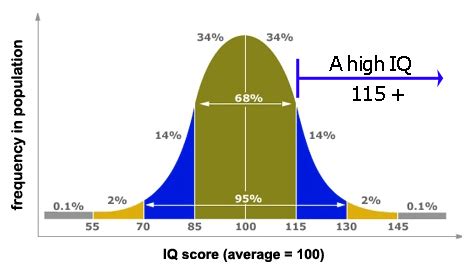Defining Intelligence
Intelligence is a complex and multifaceted concept that encompasses various cognitive abilities. One common measure of intelligence is the Intelligence Quotient (IQ), which assesses an individual’s cognitive performance relative to their peers.

Understanding IQ Scores
IQ scores are typically distributed according to a normal curve, with the majority of individuals falling within the average range of 85 to 115. Scores below 85 are considered below average, while scores above 115 are considered above average.
Significance of a 115 IQ
An IQ score of 115 falls within the above-average range. Individuals with this score demonstrate strong cognitive abilities and are typically characterized by:
- Excellent problem-solving skills
- High levels of comprehension and reasoning
- Ability to learn and adapt quickly
- Strong academic performance
Advantages of a 115 IQ
Individuals with a 115 IQ enjoy several advantages in various aspects of life:
Education: Students with an IQ of 115 tend to excel academically. They grasp concepts easily, demonstrate strong study habits, and perform well on standardized tests.
Occupation: Individuals with this IQ score are well-suited for careers that require cognitive skills, such as professionals, managers, teachers, and researchers.
Social interactions: People with a 115 IQ are often good communicators, have a wide range of interests, and can engage in meaningful conversations.
Personal development: Individuals with this score are motivated to learn and improve their knowledge and skills throughout their lives.
Limitations of IQ
While IQ scores provide valuable insights into cognitive abilities, it is important to note that they do not measure all aspects of intelligence. Other factors, such as creativity, emotional intelligence, and practical skills, also contribute to an individual’s overall intellectual capabilities.
Maximizing Cognitive Abilities
Individuals with an IQ of 115 can further enhance their cognitive abilities through various strategies:
- Challenge yourself: Engage in activities that stimulate your mind, such as puzzles, reading, and learning new skills.
- Seek feedback: Regularly ask for constructive criticism to identify areas for improvement.
- Set goals: Establish achievable goals and work towards them diligently.
- Practice mindfulness: Take time for self-reflection and identify your strengths and weaknesses.
- Connect with others: Engage in discussions, share ideas, and collaborate with individuals who possess different perspectives.
Applications of Cognitive Abilities in the Workplace
Organizations highly value individuals with strong cognitive abilities, as they contribute significantly to the success of the business. Some of the key applications of cognitive abilities in the workplace include:
| Ability | Applications |
|---|---|
| Problem-solving | Identifying and resolving challenges, developing innovative solutions |
| Critical thinking | Analyzing information, evaluating arguments, making sound decisions |
| Strategic planning | Developing long-term goals, devising effective strategies |
| Effective communication | Clearly conveying ideas, fostering collaboration, building relationships |
| Learning and adaptation | Acquiring new knowledge and skills, adjusting to changing circumstances |
Tips and Tricks for Enhancing Cognitive Performance
- Get enough sleep: Aim for 7-9 hours of quality sleep each night.
- Exercise regularly: Engage in physical activity that increases blood flow to the brain.
- Maintain a healthy diet: Choose nutrient-rich foods that support brain function.
- Play brain games: Engage in activities that challenge your cognitive abilities, such as puzzles, crosswords, and memory games.
- Socialize regularly: Connect with others, engage in meaningful conversations, and participate in social activities.
Conclusion
An IQ score of 115 indicates above-average cognitive abilities. Individuals with this score possess strong problem-solving skills, high levels of comprehension, and a quick learning curve. They excel academically, perform well in careers requiring cognitive skills, and enjoy advantages in social interactions and personal development. While IQ scores do not measure all aspects of intelligence, individuals with a 115 IQ can maximize their cognitive potential through various strategies, including challenging themselves, seeking feedback, setting goals, practicing mindfulness, and connecting with others. By embracing these strategies, individuals with a 115 IQ can harness their cognitive abilities to achieve success in both personal and professional endeavors.
